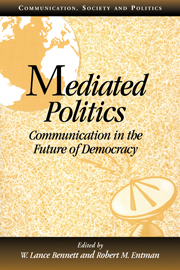Book contents
- Frontmatter
- Contents
- List of Figures
- List of Tables
- Contributors
- Preface
- Acknowledgments
- 1 Mediated Politics: An Introduction
- Part 1 Democracy and the Public Sphere
- Part 2 Citizens, Consumers, and Media in Transition
- 5 Reporting and the Push for Market-Oriented Journalism: Media Organizations as Businesses
- 6 Political Discourse and the Politics of Need: Discourses on the Good Life in Cyberspace
- 7 Dividing Practices: Segmentation and Targeting in the Emerging Public Sphere
- 8 Let Us Infotain You: Politics in the New Media Environment
- 9 The Future of the Institutional Media
- Part 3 Mediated Political Information and Public Opinion
- Part 4 Mediated Campaigns
- Part 5 Citizens: Present and Future
- Index
7 - Dividing Practices: Segmentation and Targeting in the Emerging Public Sphere
Published online by Cambridge University Press: 05 June 2012
- Frontmatter
- Contents
- List of Figures
- List of Tables
- Contributors
- Preface
- Acknowledgments
- 1 Mediated Politics: An Introduction
- Part 1 Democracy and the Public Sphere
- Part 2 Citizens, Consumers, and Media in Transition
- 5 Reporting and the Push for Market-Oriented Journalism: Media Organizations as Businesses
- 6 Political Discourse and the Politics of Need: Discourses on the Good Life in Cyberspace
- 7 Dividing Practices: Segmentation and Targeting in the Emerging Public Sphere
- 8 Let Us Infotain You: Politics in the New Media Environment
- 9 The Future of the Institutional Media
- Part 3 Mediated Political Information and Public Opinion
- Part 4 Mediated Campaigns
- Part 5 Citizens: Present and Future
- Index
Summary
INTRODUCTION
I argue in this chapter that the public sphere, including that which is emerging in cyberspace, is increasingly subject to the distorting influence of technologies developed to enhance commercial marketing: specifically segmentation and targeting.
While some will argue that politics has always been subject to a variety of techniques governed by the admonition to “divide and conquer,” I will suggest that the computer and the telecommunications networks that enable them to share vast quantities of information represent a difference in breadth and depth that requires our attention, if not our concern.
While we are well served by the reminder that “garbage in” usually results in a substantial increment of “garbage out,” it should also be recognized that the impact of flawed strategy is often just as harmful as one that is well-informed but intentionally misdirected. The analyses, constructions, and predictions that are derived from campaign management software, or consultants’ reports, while almost certain to be in error, will still nevertheless have an impact on the quality of deliberation and the public policies that eventually emerge. They will also have an impact upon the relations between people who depend upon and help to nourish the public sphere.
THE DEMOCRATIC PUBLIC SPHERE
From Habermas we have the view that democratically constituted opinion- and will-formation depends on the supply of informal public opinions that, ideally, develop in structures of an unsubverted political public sphere (Habermas 1998, p. 308). Habermas underscores the importance of deliberation to the democratic process.
- Type
- Chapter
- Information
- Mediated PoliticsCommunication in the Future of Democracy, pp. 141 - 159Publisher: Cambridge University PressPrint publication year: 2000
- 8
- Cited by



